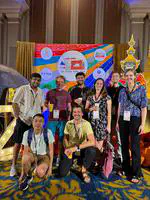Posts
Two papers from researchers in the TRAILS project have been accepted as Main and Findings papers at the 2025 Conference on Empirical Methods in Natural Language Processing (EMNLP 2025). EMNLP will take place November 4-9 in Suzhou, China. The first paper, titled “Multilingual Datasets for Custom Input Extraction and Explanation Requests Parsing in Conversational XAI Systems”, introduces two multilingual datasets in the context of Conversational XAI systems, one for intent recognition, and one for slot filling / input extraction. The second paper investigates political bias in LLMs through exchanging words in minimal sentence pairs with euphemisms or dysphemisms in German claims.
One paper by Qianli Wang and Nils Feldhus has been accepted to the Findings Track at the 63rd Annual Meeting of the Association for Computational Linguistics 2025 (ACL 2025). In the paper, they introduce ZeroCF, a faithful approach for leveraging important words derived from feature attribution methods to generate counterfactual examples in a zero-shot setting. Second, they present a new framework, FitCF, which further verifies aforementioned counterfactuals by label flip verification and then inserts them as demonstrations for few-shot prompting.
One paper originating from research in the TRAILS project has been accepted to the 10th Workshop on Representation Learning for NLP (RepL4NLP 2025), co-located with NAACL 2025. In the paper, we reimagine classical probing to evaluate knowledge transfer from simple source to more complex target tasks. Instead of probing frozen representations from a complex source task on diverse simple target probing tasks (as usually done in probing), we explore the effectiveness of embeddings from multiple simple source tasks on a single target task. Our findings reveal that task embeddings vary significantly in utility for coreference resolution, with semantic similarity tasks (e.g., paraphrase detection) proving most beneficial. Additionally, representations from intermediate layers of fine-tuned models often outperform those from final layers.
One paper from researchers in the DFKI-NLP group has been accepted as a Findings paper at the 2024 Conference on Empirical Methods in Natural Language Processing (EMNLP 2024). EMNLP will take place November 12-16 in Miami, Florida. The paper presents CoXQL, a dataset for user intent recognition for conversational XAI systems, covering 31 intents, seven of which require filling multiple slots. The paper also presents an improved parsing approach for intent recognition and slot filling on this dataset, which is evaluated using different LLMs.
Two papers from DFKI NLP researchers have been accepted at the 17th International Natural Language Generation Conference (INLG 2024) that will take place September 23-27 in Tokyo, Japan. One paper presents a case study on using large language models to produce customer-friendly help page contents from more technical text, and includes a text quality evaluation by experienced editors. The other paper analyzes echo chamber effects in LLM-based chatbots in political conversations.
DFKI will have a strong presence at the 62nd Annual Meeting of the Association for Computational Linguistics (ACL 2024), one of the top venues of language technology, that will take place August 11-16 in Bangkok, Thailand. Researchers from Speech and Language Technology department will present 6 papers. The papers appeared in the main conference (Findings) as well as 3 co-located events: The 11th Workshop on Argument Mining, the BioNLP 2024 and Shared Tasks Workshop, and the Towards Knowledgeable Language Models Workshop.
One paper by researchers from the Speech and Language Technology department of DFKI will be presented at the 18th International Workshop on Semantic Evaluation, co-located with NAACL 2024:
DFKI had a strong presence at the 2023 Conference on Empirical Methods in Natural Language Processing (EMNLP 2023), one of the top venues of language technology, that took place on December 6-10 in Singapore. The research center was represented by the departments MLT, SLT, and DRΧ with 11 papers, presented by 10 researchers. The papers appeared in the main conference as well as 3 co-located events: “Conference for Machine Translation” (WMT), “Workshop on analyzing and interpreting neural networks for NLP” (BlackboxNLP), and “Workshop on Computational Models of Reference, Anaphora and Coreference” (CRAC).
